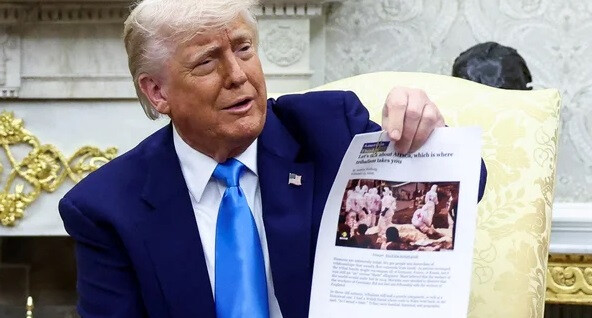
Washington D.C. – In a highly controversial exchange during a White House meeting on May 21st, President Donald Trump presented a photograph to South African President Cyril Ramaphosa, falsely claiming it depicted the massacre of white farmers in South Africa. The image, however, has been confirmed by Reuters to have been taken in the Democratic Republic of Congo (DRC), depicting victims of an M23 rebel attack. The incident has sparked outrage and highlighted the spread of misinformation at the highest levels of international diplomacy.
During the Oval Office meeting, Trump reportedly showed Ramaphosa a printed article containing the image, asserting, "These are all white farmers that are being buried." This claim aligns with a persistent, yet widely discredited, conspiracy theory on the far-right that a "white genocide" is occurring in South Africa.
However, Reuters swiftly debunked Trump's assertion, identifying the photograph as a screenshot from their own video footage captured in February in Goma, a city in eastern DRC. The original video shows humanitarian workers handling body bags following deadly clashes with the M23 Tutsi rebel group. Djaffar Al Katanty, the Reuters video journalist who filmed the original footage, expressed his shock and dismay, stating, "In view of all the world, President Trump used my image, used what I filmed in DRC to try to convince President Ramaphosa that in his country, white people are being killed by Black people."
The blog post displayed by Trump, published on the conservative online platform "American Thinker," discussed racial conflicts in both South Africa and Congo. While the article itself did not explicitly claim the image was from South Africa, it presented it in a context that allowed for such a misinterpretation. Andrea Widburg, the article's author and managing editor, later acknowledged that Trump had "misidentified the image." The White House has not yet responded to requests for comment on the matter.
This is not the first instance of Trump misrepresenting visuals to support his claims regarding South Africa. The New York Times previously reported on his mischaracterization of another video during a normal press briefing, which he claimed showed a burial site for "1,000 white farmers." That video was later identified as a memorial march held in South Africa in September 2020, commemorating the murder of a white farming couple. The white crosses seen in the footage were symbolic and temporary, not grave markers.
South African media outlets have widely condemned Trump's actions during the meeting, describing his presentation of prepared videos and articles as an "ambush." They lauded President Ramaphosa for maintaining his composure and responding with dignity amidst the confrontational approach.
In an official statement, the South African President's office affirmed that Ramaphosa's working visit to the U.S. was successful, emphasizing that both leaders agreed to strengthen trade relations, increase mutually beneficial investments, and enhance cooperation in technology exchange. The statement notably omitted any direct mention of the contentious exchange regarding the "white genocide" claims.
The South African government, along with numerous independent analysts and human rights organizations, has consistently refuted claims of a "white genocide." While South Africa does grapple with high rates of violent crime, including murders on farms, official statistics consistently show that victims are predominantly Black, reflecting the broader demographics of the country. For instance, recent data from the South African Police Service indicates that out of 26,232 murders recorded nationwide in 2024, only a small fraction (44) were linked to farming communities, and even fewer (8) were farmers themselves. Racial breakdowns, when provided, further underscore that the vast majority of crime victims are not white.
This incident underscores the ongoing challenge of combating misinformation, particularly when it emanates from influential figures. It also highlights the persistent, racially charged narratives that continue to circulate globally, often distorting complex realities for political gain. The misuse of a tragic image from the Democratic Republic of Congo, a nation grappling with its own severe humanitarian crises, for a politically motivated narrative in a different country, has drawn particular criticism from those who advocate for accurate and responsible reporting.
[Copyright (c) Global Economic Times. All Rights Reserved.]




























